|
|
|
Sort Order |
|
|
|
Items / Page
|
|
|
|
|
|
|
| Srl | Item |
| 1 |
ID:
160621
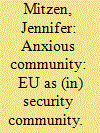

|
|
|
|
|
| Summary/Abstract |
From the Eurocrisis to the migration crisis, and from Brexit to a strengthening far right, the European Union (EU) faces multiple stressors. But while crises unleash anxiety, they do not necessarily portend the worst: because they disrupt old routines, crises can open space for new political possibilities. As a self-consciously hybrid, ‘post-national’ political form, the EU would seem poised to take advantage. Instead it is stuck. In this paper, taking an ontological security approach and focusing on EU migration governance, I propose that one cause of paralysis could lie – ironically – in an aspect of the EU that is crucial to its normative power: Europe’s long peace. An ontological security perspective highlights the management of existential anxiety as crucial to identity, suggesting how different modes of anxiety management have different political effects. Applied here, EU narratives and routines preserving ‘no war’ might suppress relations of structural power; they might mimic primitive defense mechanisms; or they might be symptoms pointing to unconscious processes keeping difficult knowledge – including colonial pasts – undealt with. I suggest how migration governance might manifest these mechanisms, contributing to the difficulties of desecuritising migration and linking its governance to EU values and institutions.
|
|
|
|
|
|
|
|
|
|
|
|
|
|
|
|
| 2 |
ID:
160615
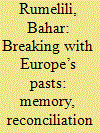

|
|
|
|
|
| Summary/Abstract |
The European Union is widely credited for consolidating a democratic “security community” in Europe, and bringing about a definitive break with war-torn and authoritarian/totalitarian pasts in many European countries. Drawing on recent discussions in ontological security studies, this article points out that these radical breaks may have come at the expense of ontological insecurity at the societal and individual levels in Europe. While conventional teleological narratives often treat reconciliation and breaking with the past as automatic by-products of European integration, ontological security theory calls for greater attention to the societal tensions and anxieties triggered by these transformations and how they are being managed –more or less successfully – through reconciliation dynamics and memory politics in different societal settings. Illustrating the variation in a number of cases, this article claims that a systematic comparative analysis of the different dynamics of reconciliation and memory politics in different European societies is central to analyzing European integration from an ontological security perspective.
|
|
|
|
|
|
|
|
|
|
|
|
|
|
|
|
| 3 |
ID:
160618
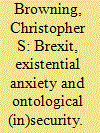

|
|
|
|
|
| Summary/Abstract |
This article explores how the Brexit Referendum on the UK's membership of the European Union has been a source of destabilisation, dread and ontological anxiety. Focusing mainly on British citizens who voted or self-identified as “Remainers”, and on EU foreign nationals resident in the UK, it shows how existential anxieties have had different points of focus for different groups of people. Confronted with such destabilising anxieties, the article shows how people have adopted different mechanisms designed to reassert a sense of order and certitude often viewed as central to preserving ontological security. The ways in which this has been done, however, can themselves raise important questions.
|
|
|
|
|
|
|
|
|
|
|
|
|
|
|
|
| 4 |
ID:
160620
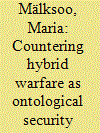

|
|
|
|
|
| Summary/Abstract |
What are the ethical pitfalls of countering hybrid warfare? This article proposes an ontological security-inspired reading of the EU and NATO’s engagement with hybrid threats. It illustrates how hybrid threat management collapses their daily security struggles into ontological security management exercise. This has major consequences for defining the threshold of an Article 5 attack and the related response for NATO, and the maintenance of a particular symbolic order and identity narrative for the EU. The institutionalisation of hybrid threat counteraction emerges as a routinisation strategy to cope with the “known unknowns”. Fostering resilience points at the problematic prospect of compromising the fuzzy distinction between politics and war: the logic of hybrid conflicts presumes that all politics could be reduced to a potential build-up phase for a full-blown confrontation. Efficient hybrid threat management faces the central paradox of militant democracy whereby the very attempt to defend democracy might harm it.
|
|
|
|
|
|
|
|
|
|
|
|
|
|
|
|
| 5 |
ID:
160613
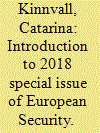

|
|
|
|
|
| Summary/Abstract |
The European Union (EU) faces many crises and risks to its security and existence. While few of them threaten the lives of EU citizens, they all create a sense of anxiety and insecurity about the future for many ordinary Europeans. Amongst these crises are the more obvious challenges of sovereign debt and fiscal austerity; refugees from conflicts in Afghanistan, Iraq, and Syria; and the rise of populist far-right parties across Europe. But behind these challenges lie less visible insecurities about economic prospects, social wellbeing, and a widespread expectation that the EU is unable to answer the challenges of twenty-first century global politics. In other words, the greatest security challenge facing people across Europe is not physical, despite the threats of Putin and ISIS, but is a sense of fear and anxiety over their daily lives.
|
|
|
|
|
|
|
|
|
|
|
|
|
|
|
|
| 6 |
ID:
160619
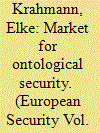

|
|
|
|
|
| Summary/Abstract |
Life in the European Union (EU) has never been as safe as it is today. Nevertheless, EU citizens express widespread anxiety about new risks, such as internal and external migration, transnational crime and terrorism, economic and fiscal uncertainty. One actor which has profited from this development is the security industry. Across Europe there are now nearly as many private security guards employed as public police forces. This article draws on the concept of ontological security to understand the discrepancy between safety and anxiety which underpins the expansion of private security services in Europe. It argues that Private Security Companies (PSCs) are involved in the construction and provision of ontological security through three mechanisms: risk identification, risk profiling and risk management. These mechanisms not only offer physical security, they also reduce existential anxieties by contributing to stable self-identities through personalised risk profiles, commodified lifestyle choices and security routines. Nevertheless, the effects are not only positive. In addition to individualisation and the responsibilization of European citizens for their own physical and ontological security these mechanisms increase societal reliance on commercial expert systems, while reinforcing the perceived failure of the EU as a political and collective security community.
|
|
|
|
|
|
|
|
|
|
|
|
|
|
|
|
| 7 |
ID:
160614
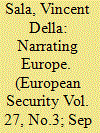

|
|
|
|
|
| Summary/Abstract |
Identifying the narratives that social actors tell and use can provide us with some insight into how they have understood the world around them, when and how they should act and why. The argument about narratives and ontological security in the EU will make three points when examining two European stories: the EU's foundational narrative and that of united in diversity. First, the EU seeks ontological security generated through narratives. Second, the EU's narratives are not that different from those of national experiences. Third, and relatedly, narratives that attempt to construct ontological security for the EU may increase ontological insecurity in other actors.
|
|
|
|
|
|
|
|
|
|
|
|
|
|
|
|
| 8 |
ID:
160616


|
|
|
|
|
| Summary/Abstract |
Post-communist states today are dealing with conflicting sources of ontological insecurity. They are anxious to be perceived as fully European by “core” European states, a status that remains fleeting. Being fully European, however, means sharing in the cosmopolitan European narratives of the twentieth century, perhaps the strongest being the narrative of the Holocaust. Influencing the European Union’s own memory politics and legislation in the process, post-communist states have attempted to resolve these insecurities by undergoing a radical revision of their respective Holocaust remembrance where the memory, symbols, and imagery of the Holocaust become appropriated to represent crimes of communism. By rejecting the cosmopolitan European narrative of the Holocaust, post-communist states have also removed anti-fascist resistance from the core memory of the Holocaust, allowing for a revival and ideological normalisation of contemporary fascist ideological movements. I illustrate the argument with an overview of contemporary Holocaust remembrance practices in the EU’s youngest member, Croatia.
|
|
|
|
|
|
|
|
|
|
|
|
|
|
|
|
| 9 |
ID:
160617
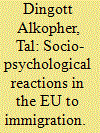

|
|
|
|
|
| Summary/Abstract |
This paper examines the EU and EU member states’ reactions to the 2015 refugee crisis from an ontological security perspective while arguing that these reactions are the product of three socio-psychological lenses, which have led to various responses to the perceived threat. The first reaction, ascribed especially to the Visegrad Four, is the “securitise-the-self” reaction to feelings of anxiety and ontological insecurity and involves reaffirmation of national biographical narratives and national immigration policies at the expense of supranational European policies. The second reaction is illustrated by the European Commission's response to the refugee crisis and involves “managing securitisation.” Accordingly, the Commission's reaction to ontological insecurity when faced with the challenge of unmanaged migration was to reaffirm the EU's semi-sovereign identity (collective border control competencies) while preserving a global discourse on human rights and refugee-related inclusive norms. The third reaction stemmed from viewing the crisis with the lenses of “empathy” and “desecuritisation” and is best illustrated by Germany's temporary “open door” policy on refugees that was driven by a psychological lack of perceived threat from the “immigrant-other” and a “civilian power” collective identity. The paper argues that recognising these three lenses can help us to understand socio-psychological reactions to immigration in the EU.
|
|
|
|
|
|
|
|
|
|
|
|
|
|
|
|
|
|
|
|
|